Is the King James Version (KJV) Too Hard to Understand? James White / Thomas Ross Debate Review 11
Is the King James Version of the Bible too hard to understand? In the James White and Thomas Ross KJV vs. LSB King James Only debate Dr. James R. White claimed that the linguistic level of the Authorized, King James Bible is too difficult. He made the same claim in his book The King James Only Controversy. Furthermore, White argued that the level of English in the KJV contradicted the expressed statements in the “Translators to the Reader” about vernacular translation, so modern English versions are superior to the King James Bible. Dr. White said: "“translations should be in the common language ... the idea of having a translation that is not in the language of the people … is the exact opposite of the perspective that [the KJV translators] had.” Are Dr. White's claims valid?
The KJV's "Translators to the Reader" indicates that they retained "old Ecclesiastical words" not commonly in use. They also said: "[W]e desire that the Scripture may SPEAK LIKE ITSELF ... that it may be UNDERSTOOD even of the very vulgar." Notice that the KJV never said that it was IN the language of the common, the “very vulgar.” It said it wanted the common people to UNDERSTAND it. The KJV rejected the Roman Catholic practice of deliberately making Scripture hard to understand. However, the KJV retained old ecclesiastical words which were not very likely to be used regularly by commoners. It avoided the obscurantism and deliberate difficulty of a Catholicism that wanted to conceal the meaning of Scripture from the people, while also retaining some language that was above the level of ordinary speech for the sake of accuracy and precision. (Consider the KJV's use of thee, thou, thy, and thine for the Hebrew and Greek 2nd person singular personal pronouns, and ye, you, and your only for the 2nd person plural, as an instance of the KJV's prioritizing accuracy over words in common use.) The KJV translators taught that the Bible must not be hidden in Latin, but neither must it be at the lowest level of language currently spoken. It must be understood by the commoner, but its own linguistic level is at the level of the original Hebrew and Greek text-Scripture must "speak like itself."
What type of English does the King James Version use? The KJV is not Old English like Beowulf, nor Middle English like Geoffrey Chaucer's The Canterbury Tales, but Modern English. Early Modern English, yes-but Modern English. Indeed, the translation of the King James Bible marks the beginning of Modern English, according to scholars of the English language:
Old English or Anglo-Saxon -1100
Transition Old English, or “Semi-Saxon” 1100-1200
Early Middle English, or “Early English” 1200-1300
Late Middle English 1300-1400
Early Modern English, “Tudor English” 1485-1611
Modern English 1611-onward
The crucial question: Is the English of the King James Version significantly more complex and harder to understand English than the Greek of the New Testament was to the New Testament people of God or the Hebrew of the Old Testament was to Israel? The answer: No!
The New Testament contains challenging Greek (Hebrews, Luke, Acts) as well as simple Greek (John, 1-3 John). Sometimes the New Testament contains really long sentences, such as Ephesians 1:3-14, which is all just one sentence in Greek. The Holy Ghost did not just dictate very short Greek sentences like “Jesus wept” (John 11:35) but also very long sentences, like Ephesians 1:3-14. God did not believe such sentences were too hard to understand, and both God and the Apostle Paul were happy for inspired epistles with such complex syntax to be sent to churches like that at Ephesus--congregations that were filled, not with highbrow urban elites, but with slaves, with poorly educated day laborers, with farmers, and with simple peasants who had believed on the Lord Jesus Christ. The New Testament is not written IN the language of the “very vulgar,” but is CAN be UNDERSTOOD by the common man who puts in a little effort. The common man did NOT speak in sentences like Ephesians 1:3-14, but such sentences COULD BE UNDERSTOOD with a little work.
What about the Old Testament? Parts of the Hebrew prophetic and poetical books are much more challenging Hebrew than are many of the narrative sections of the Hebrew Bible. The Old Testament also contains some very long sentences. The whole chapter, Proverbs 2, is one sentence in Hebrew! Both the Hebrew and Greek Bible contain sentences and syntactical structures that are considerably more complex than anything found in the King James Bible. There are also approximately 300 "hard" or archaic words in the King James Version, and around 3,600 "hard" words, hapax legomena, in the original language text-the KJV has less than 10% of the "hard" words in the Greek and Hebrew! If the KJV must be abandoned because it is too hard to understand, it would also be necessary to get rid of the infallible Hebrew and Greek text (were James’ argument valid, which it is not).
-
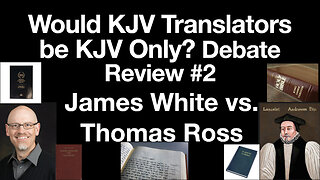 1:23:14
1:23:14
KJBIBLE1611
1 year agoJames White & Thomas Ross Debate Review #2: "King James Version Translators Prefer LSB to KJV / TR"?
7.14K4 -
 22:21
22:21
KJBIBLE1611
11 months agoJames White & Thomas Ross Debate Review #3: The Epistle Dedicatory: KJV Translators Say KJV is Best
7.29K -
 29:30
29:30
God will not be mocked 24 7 News
5 months agoGenesis King James Version (KJV) vs The message bible (MSG)
181 -
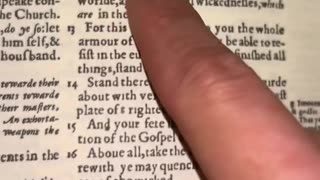 1:27
1:27
Present Truth
5 months agoKing James Version Bible versus Geneva Bible 1560
9462 -
 1:20:59
1:20:59
vietrandy
7 months agoWhich King James Bible Version would I recommend?
816 -
 5:53
5:53
papagiorgio200
2 months agoWhy The Book of Enoch Is Not in the Canon | James White
258 -
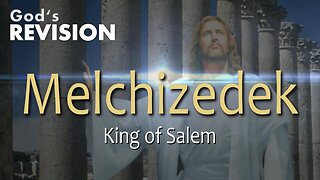 15:11
15:11
Jesus' Revelations thru Jakob Lorber English
7 months agoWho was Melchizedek ... The King of Salem ? ❤️ Statements from the Lord thru Jakob Lorber
233 -
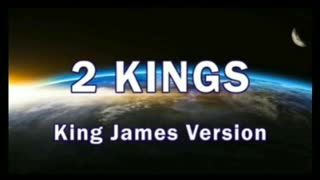 7:25
7:25
Mybritexpress98
1 year agoThe Book of 2 Kings Chapter 23 KJV Read by Alexander Scourby
64 -
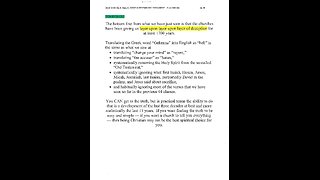 2:12:20
2:12:20
BartBaconshereticalBibleclass
2 months ago45th session. 3-6-24. FUNDAMENTALS OF READING THE BIBLE
2415 -
 37:39
37:39
HandinHandwithGodTv
1 year agoPower To Triumph || The Final Judgment Is At The Great White Thone, Accept Jesus || April 26, 2023
21